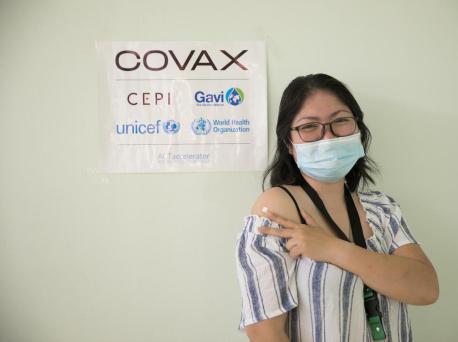
In the Philippines, Brave Health Workers Won't Let COVID-19 Stop Them
For the dedicated front line doctors and nurses at Dr. Joseph Fabella Memorial Hospital in Manila, caring for patients during the pandemic has meant months away from their families — and the constant threat of contracting COVID-19.
"Generally we do our best to protect ourselves by wearing personal protective equipment. But then we have our obligation to see our patients," said Dr. Paula Syrah Esguerra, a fellow-in-training for maternal-fetal medicine (above). "We just have to pray that we don't get infected."
Lockdowns and quarantine protocols kept doctors and nurses from seeing their families for months at a time
On March 4, more than 480,000 COVID-19 vaccine doses arrived in the Philippines via the COVAX Facility. Hardworking health workers and people with underlying health conditions were among the first to be vaccinated. For ICU nurse Kareen Mae Abalahin (above), that meant a chance to see her husband and son again, after almost four long months apart.
"I have this hope that I will go home soon," she said. "I can hug them, I can kiss them."
"Knowing that I've been vaccinated, I know that I have an added layer of protection. Vaccines have been studied well and have been proven throughout the years, with the eradication of some of the virusus like smallpox. Because of this vaccine, we are protected and we are protecting [our patients] also."
As leader of procurement and supply for the COVAX Facility, UNICEF is working to ensure the equitable distribution of COVID-19 vaccines worldwide
COVAX is co-led by Gavi, the Vaccine Alliance, the World Health Organization (WHO) and the Coalition for Epidemic Preparedness Innovations (CEPI), working in partnership with UNICEF as well as the World Bank, civil society organisations, manufacturers and others. To protect communities around the world, COVAX will deliver 2 billion COVID-19 vaccine doses — including 1.2 billion doses to low- and lower-middle-income countries — in 2021. Initial doses are being used to protect health care and front line workers and other high-risk individuals.
Your generosity can help support UNICEF 's work to ensure equitable, affordable access to COVID-19 vaccines for every country, regardless of income. Please donate.
Top photo: On March 10, 2021, Dr. Paula Syrah Esguerra, 37, fellow-in-training for maternal-fetal medicine at Dr. Jose Fabella Memorial Hospital in Manila, gets her first dose of the COVID-19 vaccine provided by the COVAX Facility. © UNICEF/UN0428442/Verzosa. Video: Tong Su
HOW TO HELP
There are many ways to make a difference
War, famine, poverty, natural disasters — threats to the world's children keep coming. But UNICEF won't stop working to keep children healthy and safe.
UNICEF works in over 190 countries and territories — more places than any other children's organization. UNICEF has the world's largest humanitarian warehouse and, when disaster strikes, can get supplies almost anywhere within 72 hours. Constantly innovating, always advocating for a better world for children, UNICEF works to ensure that every child can grow up healthy, educated, protected and respected.
Would you like to help give all children the opportunity to reach their full potential? There are many ways to get involved.





